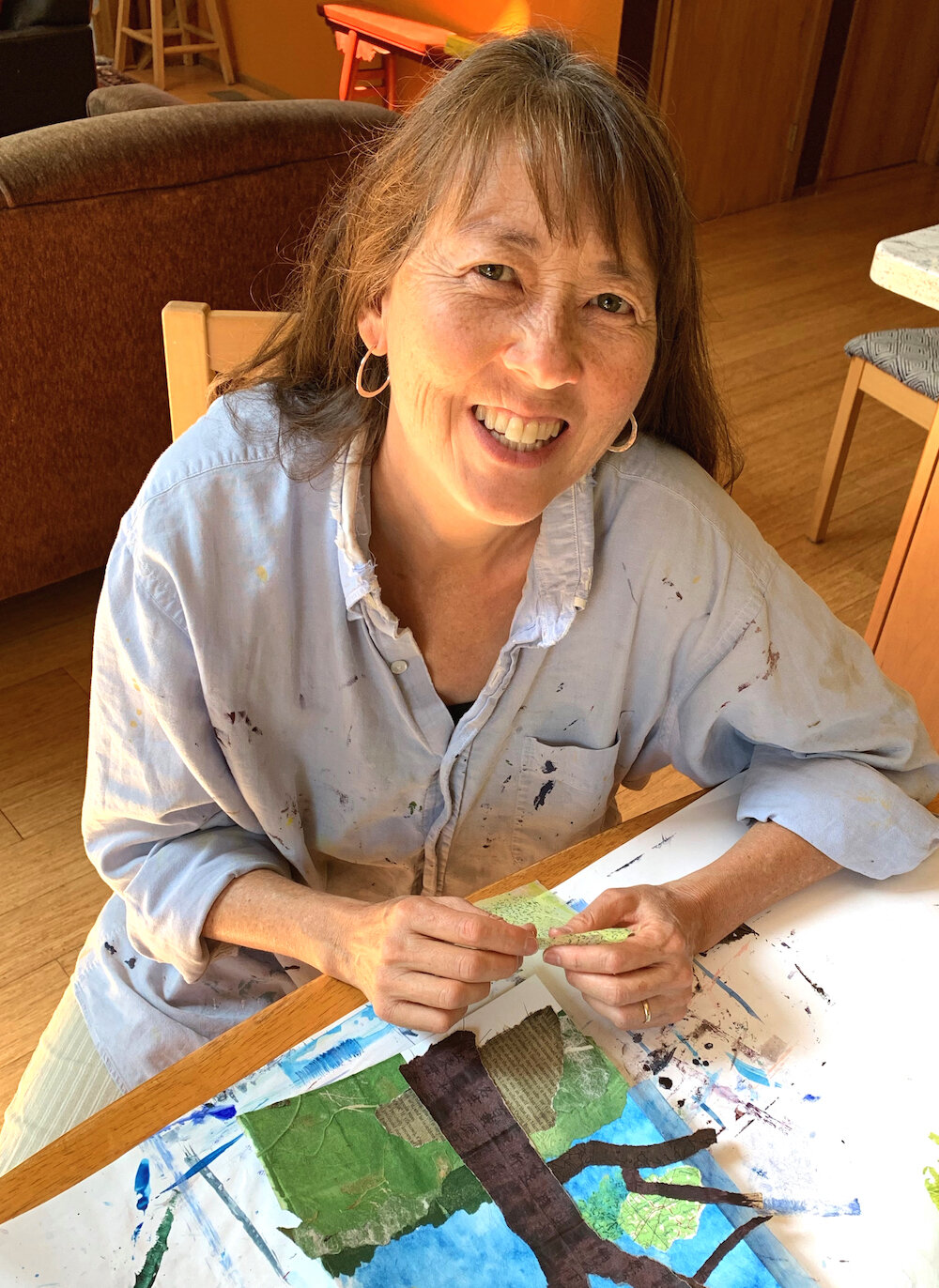Annette Makino of Arcata has been making art since she was a child. She’s now creating collage using hand-painted and torn washi papers combined with old letters, book pages, maps and other found papers. Her work also includes original haiku.
BY HEATHER SHELTON, TIMES-STANDARD, EUREKA, CA, NOV. 13, 2020
Local artist Annette Makino has found herself with more time on her hands during the COVID-19 health crisis, and she has used those extra hours to come up with a brand new artistic approach.
“With fairs and art shows canceled this year and some of my retailers seeing reduced sales, the pandemic has slowed down my business,” Makino said. “The silver lining of this difficult time is that I’ve had more time to play in the studio.”
After 10 years of working in watercolor and sumi ink, Makino recently switched gears and started making collages from hand-painted and torn washi papers, sometimes combined with old letters, book pages, maps, junk mail and other found papers. The collages, she said, draw inspiration from the natural landscapes of Northern California and from her Japanese heritage.
“I start with white washi paper, which is traditional Japanese paper that often has bits of leaves, rice straw or other plant fibers embedded in it,” Makino said. “I mix my own paint colors and paint the paper, then tear it as needed for my collages. … Recent collages include bits of a musical score from my choir, old family photos and a letter from my sister. It’s really meaningful to be able to incorporate different aspects of my life into my art.”
Annette Makino says the COVID-19 pandemic has influenced her haiku and art. This work was created in recent months. “(It) reflects a sense of the transience of human existence,” Makino said.
She added: “The fun thing about collage is that you can use any materials you want to make something interesting and meaningful. I paint and decorate all sorts of papers for my art, but I also save things like old keys, bird feathers and foreign stamps for possible use in collages. It fascinates me how a beautiful collage can come together from torn paper and odd bits.”
One thing that hasn’t changed in Makino’s work over the past months is the incorporation of original haiku in her creations.
Makino — who has been making art since she was a child — learned about the Japanese tradition of “haiga,” or art combined with haiku, in 2010.
“I started creating my own haiga, writing haiku and making paintings with Japanese watercolors and sumi ink,” she said. “In 2011, I started my art business, Makino Studios, which sells cards, prints and calendars of my work in stores and online.”
Haiku, she said, is a compact form of poetry, typically three short lines.
This original haiku, featured on Annette Makino’s collage work, was just published in Modern Haiku magazine.
“To write it effectively, you have to distill an observation or experience down to its essence,” Makino said. “I appreciate how the haiku mindset helps me to be more present in the moment, noticing little things like the way the woods look after a rainstorm.”
She shares this haiku — just published in Modern Haiku magazine — about her imagery above:
shortest day
on the tip of each fern
a drop of light
A few weeks ago, Makino attended a virtual haiku conference, the Seabeck Haiku Getaway, which is normally held in Washington State.
“There were about 160 haiku poets from 14 countries, some staying up all night in their time zone to participate,” she said. “It was a lot of fun to connect with this community, even via Zoom. I gave a presentation on my new collage haiga there, the first time I’d presented this new work in a public forum, and I’m happy to say it was very warmly received.”
Pictured is one of Annette Makino’s new collage works. The featured haiku recently won first place in the Porad Haiku Award program.
Makino’s haiku are regularly published in leading journals of haiku and have also appeared in a number of haiku anthologies, including the Red Moon Anthology, and she just won first place in the Porad Haiku Award sponsored by Haiku Northwest for this work:
long before language the S of the river
“It was written during a walk along the Klamath River in Orleans, and my collage is based on a photo I took there,” she said.
Twelve of Makino’s collages are featured in her 2021 haiga calendar which, along with note cards and signed prints, are available at the “Made in Humboldt” event at Pierson Garden Shop in Eureka through Dec. 24.
“This will be the only fair where you can find my work this season,” said Makino, whose work is also available at several local stores in Eureka, Arcata, McKinleyville, Trinidad and Manila. Her work is available on her website, https://www.makinostudios.com, as well.
In addition to her new collages, Makino is still offering her watercolor cards and prints for sale.
“I’m grateful to have a loyal fan base here in Humboldt and I want to make sure people can still find their favorite designs,” she said.




